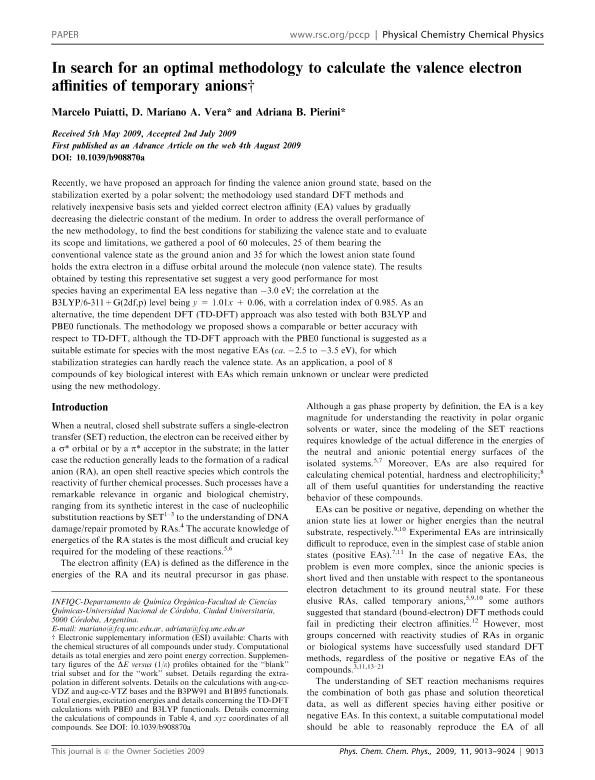Artículo
In search for an optimal methodology to calculate the valence electron affinities of temporary anions
Fecha de publicación:
08/2009
Editorial:
Royal Society of Chemistry
Revista:
Physical Chemistry Chemical Physics
ISSN:
1463-9076
Idioma:
Inglés
Tipo de recurso:
Artículo publicado
Clasificación temática:
Resumen
Recently, we have proposed an approach for finding the valence anion ground state, based on the stabilization exerted by a polar solvent; the methodology used standard DFT methods and relatively inexpensive basis sets and yielded correct electron affinity (EA) values by gradually decreasing the dielectric constant of the medium. In order to address the overall performance of the new methodology, to find the best conditions for stabilizing the valence state and to evaluate its scope and limitations, we gathered a pool of 60 molecules, 25 of them bearing the conventional valence state as the ground anion and 35 for which the lowest anion state found holds the extra electron in a diffuse orbital around the molecule (non valence state). The results obtained by testing this representative set suggest a very good performance for most species having an experimental EA less negative than -3.0 eV; the correlation at the B3LYP/6-311+G(2df,p) level being y = 1.01x + 0.06, with a correlation index of 0.985. As an alternative, the time dependent DFT (TD-DFT) approach was also tested with both B3LYP and PBE0 functionals. The methodology we proposed shows a comparable or better accuracy with respect to TD-DFT, although the TD-DFT approach with the PBE0 functional is suggested as a suitable estimate for species with the most negative EAs (ca.-2.5 to -3.5 eV), for which stabilization strategies can hardly reach the valence state. As an application, a pool of 8 compounds of key biological interest with EAs which remain unknown or unclear were predicted using the new methodology.
Palabras clave:
Negative Electron Affinity
,
Radical Anions
,
Dft
,
Td-Dft
Archivos asociados
Licencia
Identificadores
Colecciones
Articulos(CCT - MAR DEL PLATA)
Articulos de CTRO.CIENTIFICO TECNOL.CONICET - MAR DEL PLATA
Articulos de CTRO.CIENTIFICO TECNOL.CONICET - MAR DEL PLATA
Articulos(INFIQC)
Articulos de INST.DE INVESTIGACIONES EN FISICO- QUIMICA DE CORDOBA
Articulos de INST.DE INVESTIGACIONES EN FISICO- QUIMICA DE CORDOBA
Citación
Puiatti, Marcelo; Vera, Domingo Mariano Adolfo; Pierini, Adriana Beatriz; In search for an optimal methodology to calculate the valence electron affinities of temporary anions; Royal Society of Chemistry; Physical Chemistry Chemical Physics; 11; 40; 8-2009; 9013-9024
Compartir
Altmétricas




